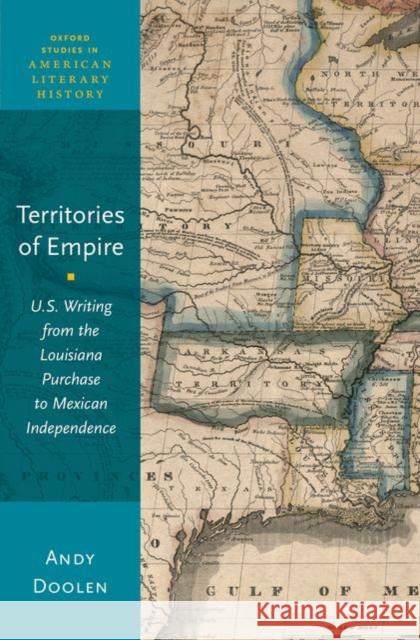Territories of Empire: U.S. Writing from the Louisiana Purchase to Mexican Independence » książka
topmenu
Territories of Empire: U.S. Writing from the Louisiana Purchase to Mexican Independence
ISBN-13: 9780199348626 / Angielski / Twarda / 2014 / 288 str.
Territories of Empire: U.S. Writing from the Louisiana Purchase to Mexican Independence
ISBN-13: 9780199348626 / Angielski / Twarda / 2014 / 288 str.
cena 317,67 zł
(netto: 302,54 VAT: 5%)
Najniższa cena z 30 dni: 306,96 zł
(netto: 302,54 VAT: 5%)
Najniższa cena z 30 dni: 306,96 zł
Termin realizacji zamówienia:
ok. 30 dni roboczych.
ok. 30 dni roboczych.
Darmowa dostawa!
In contrast to later imperial pursuits in Mexico, Cuba, and the Philippines, the early United States extended its boundaries through less sensational modes of territorialization: land deals, slavery expansion, treaty diplomacy, immigration and settlement, and the addition of new states on the border. Never the exclusive top-down product of any single strategic plan, empire building relied rather on a hazy, ever-shifting boundary between state and non-state action.
Territories of Empire examines the border writings of U.S. explorers, politicians, travelers, novelists, merchants, newspapermen, and other eye-witnesses to the rapid expansion of the United States in the aftermath of the Louisiana Purchase. It traces how different authors and texts imagined the relations between nation-state and border and reveals how continental ambitions were achieved through the uneven and unpredictable process of territorialization. Andy Doolen looks to writings as dissimilar as Kentucky newspaper accounts of the Aaron Burr conspiracy, the explorer Zebulon Pike's 1810 account of making peace with the Santee Sioux before becoming terribly lost near the upper Rio Grande, and Timothy Flint's 1826 novel about a young New Englander who fights in the Mexican independence struggle in showing how national sentiments were galvanized in support of greater territorial and commercial growth. To this end, Doolen makes clear how both private citizens and government officials collectively authored the spatial logic of a continental republic. Combining textual analysis with theories of transnationalism and empire, Territories of Empire reconstructs the development of a continental imaginary highly attuned to the objectives of U.S. imperialism, while often betraying an unsettling awareness of resistance and diversity beyond the border.










